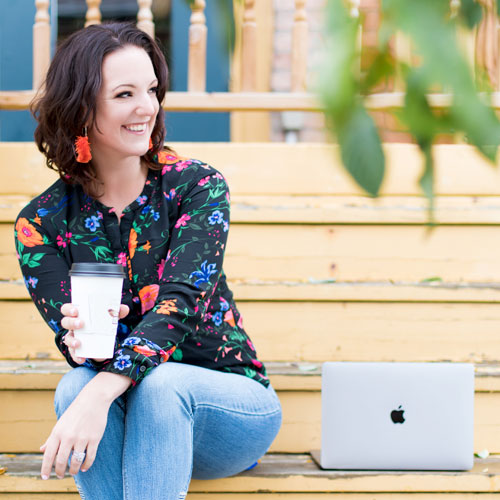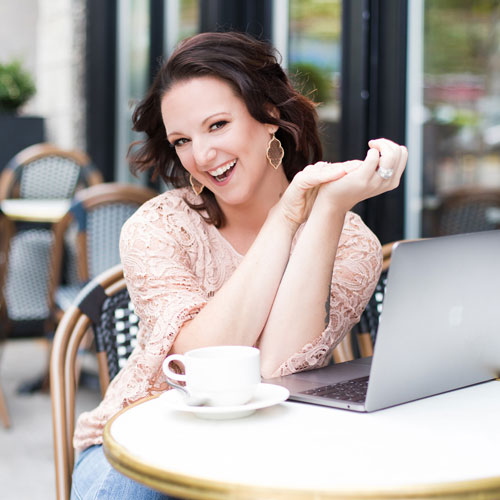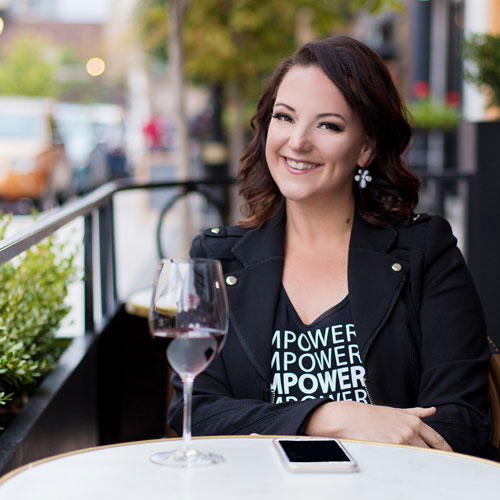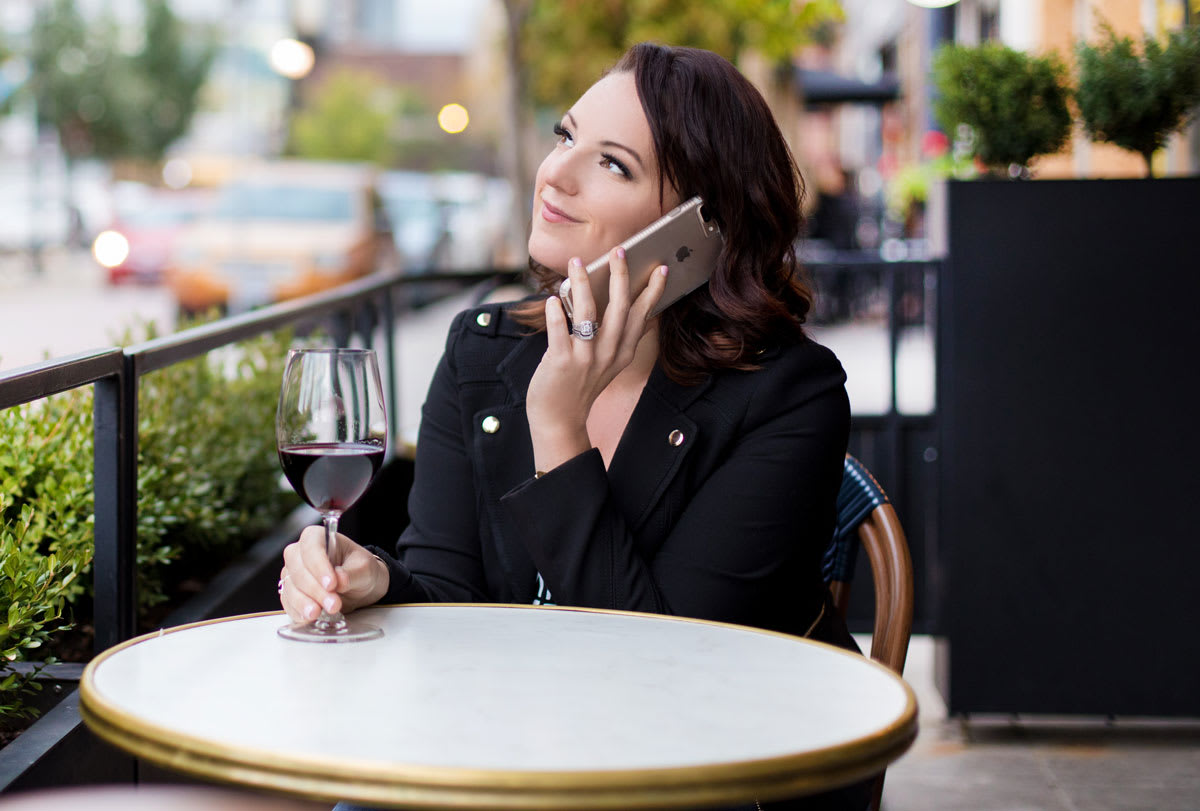
If you remain stuck with where you are and refuse to stretch, then success will never find you at all. Above seeking personal growth, reaching for success is also going on a mission of uplifting people. Hayden Humphrey joins Lisa Pezik to talk about her own life centered on helping people craft a good script for their lives based on inner intuition, letting go of the Lone Wolf and Imposter Syndromes that usually hinder positive change. He also talks about the power of empowering mental health through psychedelic-assisted therapies, which is quite unappreciated even in modern society. Hayden goes deep into the strength of being vulnerable and embracing fear, which opens wide the possibilities for deeper connection and collaboration.
---
Watch the episode here:
Listen to the podcast here:
Break Up With The Script And Build A Joyful Business And Life With Hayden Humphrey
Even though this show is named after me, probably because I wasn't clever enough to come up with something clever, it has nothing to do with me. It's all about the amazing guests that I bring on that shake things up a little bit for you. Whether you're with pen and paper in hand, ready to dive in, reading while you're out for a walk or folding the laundry, it's to grab you and go, "I never thought about things that way. I never realize that if this person can do it, I can do it too." It's about finding that nugget of wisdom that you can take and do differently after you read this blog.
I'm so excited. I know you're reading and you can't see but those of you who can see, I have this amazing T-shirt on that says, "I am love." I love words of affirmation. I love when we can put positivity right in front of our face. Not only does it help you when you are staring in the mirror but the people that you pass, that you're in the elevator with, that you're at the grocery store with, that you're on calls with, you never know where that message is going to land. I have the creator of this apparel line here with me. He is so much more than just that. Hayden, welcome. Thank you for being here.
Lisa, thank you so much for having me. I'm excited to be here.
Let me tell you about Hayden. Hayden Humphrey is an uplifter, out to help people craft unscripted lives. As a Coach, he empowers people to break up with the scripts they are given so they can build careers and businesses that are aligned, authentic and joyful. Outside of his coaching practice, he consults with leaders in the personal development and healing industries to cultivate their authority and thought leadership. He also founded Lift Apparel, a conscious clothing company that spreads love and supports mental health by donating 10% of profits to mental health advocacy organizations and all the information in about how you can pick up these shirts. To me, it was a win-win. I was like, "Words of affirmation and donation to mental health resources and charities? Win-win. Yes. Here is my money. You got it." Hayden, how did you get here with all of this goodness?
You got to step out in service of becoming the person that you want to become and create life the way that you want to see it.
A lot of living inside the script. Doing the right things when I thought I was supposed to be doing them. I went to college, graduated with a Business degree and moved to San Francisco to work at flashy name brand technology companies. When I moved here to Chicago, I was working with LinkedIn at the time, I had this a-ha moment after I missed a sales quota at work that I had been doing everything that I thought that I was supposed to be doing. I did everything because I thought it was impressive and would get people to like me instead of what I wanted to be doing, which was crafting my own life, creating my own life and schedule, supporting things that I felt were important, making the impact that I wanted to make, being able to work with people in the way that I wanted to.
That was in mid-2017. For the last three and a half years, I've been dedicating myself to learning more about how to uplift and support people in their own healing and coming home to themselves. That's taken a couple of different shapes and forms. A lot of the work that I do now is as a coach, supporting people in breaking up with the script that they were given and becoming the creators of their own lives. I'm sure you've had the same experience. The fun thing about entrepreneurship is it gets to take a lot of different forms. We get to try out a lot of different things. We get to experiment and use our powers for good, in a sense.
Specifically with Lift Apparel, they came about as a result of some live experiences that I was creating here in Chicago pre-pandemic. The idea was bringing people together to have these unfiltered, authentic conversations about things that mattered and have that experience. One thing that I started doing was creating these shirts as a reminder and token of your experience to remind you of it. Even though we stopped doing those events for obvious reasons, I kept designing these shirts and having people asking me like, "Where can I get those shirts?" Eventually, I was like, "I think that there's enough of a demand. I should probably put up a store and see what happens." The cool part about the experience of creating this particular store was how clear it was from the get-go of how I wanted to build it. It became very clear to me early on.
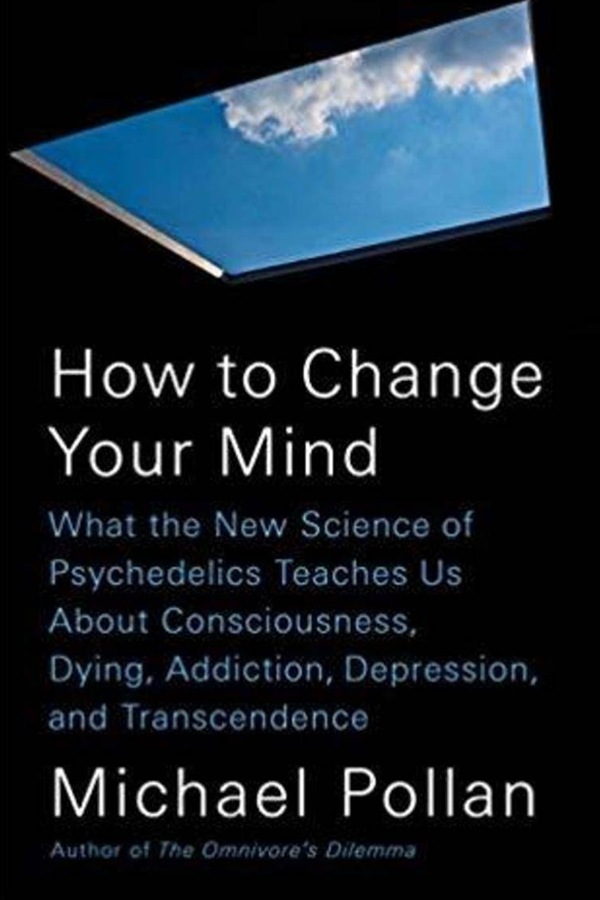
This brand has two purposes. The first is to spread love. All of the messages are rooted in kindness, compassion and love. The second main purpose of this brand is to support mental health advocacy. I have seen my life transform and change in such a profound way because of the access that I've had to mental health services, therapy, psychedelic therapy, coaching and all of these different healing modalities. I think that anyone's quality of life can be very dramatically impacted by getting support around their mental health and not everyone has the same kind of access.
One of the intentions of this brand is to support mental health advocacy but specifically, mental health advocacy with populations that are generally underserved and don't have the same level of access to mental health services and support. Black and brown women, Native American groups, those kinds of populations. I think that it's so profound the change that you can make for people when people get to talk about and come to terms with their mental health. Everything that I'm doing now is around that same kind of mission, "How do I uplift people? How do I help people live better lives?" It's been a lot of fun process.
Two words that jumped out to me, you said you were very clear about the brand, spread love and support mental health. Spread and support. I build a lot of businesses and brands for a lot of people. That's what we do. It's like, "What is my ROI going to be? What am I going to get back? Where is this going to take me? What stages and platforms might I get on?" I go, "If we're not providing transformation, there's a reason why it says, 'A give and take.' There's a reason why the give comes first."
I love that you were very clear about the mission of the work that you do, whether it's the apparel company or you’re coaching. It's transformation, spreading love, supporting mental health and giving first before taking. I think if we could all wrap our head around that, start there with your business. That's probably why you have the success. Sweat equity, putting in the hours like a roller coaster of entrepreneurship that we've all been through. One thing, the foundation anchor of why you were doing it is so clear. I don't know what psychedelic therapy is. You dropped that bomb in there a little bit. Tell people about that.
Psychedelic assisted therapy is looking at therapy that's assisted by psychedelics. Stuff like psilocybin, LSD, ketamine, substances that would fit in that category. It's something that I have become a lot more passionate about and want to be an advocate for. Unfortunately, it might freak people out a little bit to hear that idea or concept because psychedelics have been largely stigmatized. They're illegal at a federal level because they've been stigmatized. Unfortunately, they've garnered this story and background that confuses and muddles the truth and obfuscates the real healing power in these substances. Part of what kicked this off for me was I read a book by Michael Pollan called How to Change Your Mind. It's a brilliant book if you haven't read it.
One of the things he does is he looks at studies that have been done over the course of the last 80 years or so specifically in the US and looking at psychedelic-assisted therapy for things like anxiety, depression, PTSD, alcoholism and addictions. When you look at the effectiveness of those kinds of therapies, it's crazy. It's almost unreal when you look at how supportive it is for people and how healing one psychedelic experience can be for people as compared to a regular talk therapy, those kinds of therapies. Those therapies are great. I still see a therapist every other week or so but I'm so passionate about changing the stigma around it and bringing more light to it. There's a huge opportunity to alleviate a lot of suffering and remove the stigma and backstory that unfortunately has gotten attributed to these things.
That's part of what I want to do both through my own speaking and through talking about it in conversations like this but also through the company as well. I had the opportunity to donate. For example, each month, I take 10% of the profits from the sales and donate them to organizations. I got to donate to a group called The Sabina Project, which is an organization that is specifically focused on people of color and supporting people of color through psychedelic therapy, helping them gain access to psychedelic therapy experiences. It's so cool. I get excited about it. There's so much opportunity that this could change a lot of people's lives. That's part of the reason why I'm becoming more and more of an outspoken advocate for it.
You have to be willing to open up and receive support.
You get to pick your path in how you want to heal. Before I became an entrepreneur, I'm a nurse by degree. I worked in intensive care units, end-of-life care, palliative care, people dying with life-limiting illnesses. I remember when all the medical marijuana was coming about. People said to me, "What do you think about medical marijuana?" I was like, "Personally, other than wine and beer, I've never done a drug in my life. If someone is flat out telling me that it makes them feel better, lessens their pain and anxiety, helps them sleep better or allows them to walk into rooms that they couldn't walk into before, I'm all for it." Who are we to say what experience is right and wrong and good and bad? I love that you're trailblazing a bit and stepping into an area that is stigmatized or people don't know much about.
I think it's important to make the distinction between, it might seem like a nuanced distinction but the distinction between a drug and a plant medicine. That's how I talk about these things as being a plant medicine, specifically psilocybin and cannabis. Are there opportunities for addiction and abuse? Absolutely. As there is with alcohol, you can much more easily kill yourself drinking than you can with a lot of these other substances. It's the cultural norm that's been adopted around alcohol that we don't look at it as a problem and because of the cultural stigma that's been applied to things like cannabis, psilocybin or any of those. Ayahuasca, it's now an issue. It's silly. When you think, you're like, "This is the story that I've been told and the story that I bought into." When you take a step back and look at the facts like, "This is not the way that I thought that it was."
As with anything, any medicine and therapy, when used properly, there are less side effects with plant medicine than there is with a lot of the pills and things that we give people for depression and anxiety. The world is shifting. Especially this time, even in 2020, the world has shifted in what do we believe. The through line for you, you're even talking about breaking up the script with how we feel about these alternative therapies and things that we have breaking that stigma. The first step is probably being aware that you have a stigma and that you think a certain way.
I can remember even people dying, 90-year-olds, 95 dying and family members coming and going, "Don't give them morphine. I heard you could become addicted to that thing." I'm like, "I'm not talking about street drugs. I'm talking about pain medicine for your mother or father or whoever that is actively dying. Why would we not want to make it comfortable for them to exit this world?" What a gift it is. I always thought that it was such an honor to be with someone in their final hours and days but even that to control like, "Don't do this. Don't do that." I'm like, "No, there's such a stigma. What you're thinking isn't correct. Let me help educate you about that thing.
I think there's so much to be said. It's like the underlying conversation is one of, "Where are you taking guidance? Are you listening to these societally-conditioned stories about what's okay and what's acceptable, who you're supposed to be and how things are supposed to go? Are you in touch with your inner intuition?" I believe that we are our own best healers. I believe that if you are in touch with yourself and coming from a very loving place, you know what you need. I think that there's so much to be said for, "Where are we taking guidance from? Who are we listening to?" It's starting to separate ourselves from these stories that we picked up when we were kids about how it's supposed to look and giving ourselves the grace of saying, "Because I love myself and I'm a whole complete human being exactly as I am, where do I want to go from here? How do I want to live my life? What are the things that I want to do? Who do I want to be out in the world?"

To me, it's a much more powerful conversation. It's a scarier conversation for a lot of people because the script is comfortable, acceptable and normalized. There's conformity to it. You know that you're not going to ruffle any feathers in following those things. It's scary to break out of that. It's scary to have your own opinion. It's scary to get on a show and talk about psychedelic therapy, talk about changing the stigma and doing those things. That's leadership. That's life. That is a life worth living. Creating a life that is truly reflective of you where you feel joyful, connected, intimate and powerful, that's what's required. You have to take a stand. You’ve got to love yourself enough to take a stand. That's why I do the work that I do. It's like, "Let's help people understand how possible this is and how within grasp this is. You’ve just got to be willing to do the work."
I'm writing down, "You’ve got to love yourself enough to take a stand." My one friend, who's a coach, describes the comfort zone as a pee-soaked bed. She was like, "It feels good for a couple of seconds and then it's uncomfortable." I was like, "I've never heard someone describe it like that." It's so true. The script is comfortable. When you were changing out of doing all the things that you thought, you looked good on paper. It was like, "I had the job. I had the career, all the things." You realized, "Dear, I cannot. From the outside, it looks like I have so much. From the inside, I'm not feeling very fulfilled or filled up." Did fears come into your mind about like, "If I'm going to do this, oh dear?"
Yes. I feel very lucky that I come from a family of entrepreneurs, when I got to the place where I was like, "This whole corporate thing, this whole sales thing, not for me. I want to be doing something else." I told my family. Luckily, they also owned their own businesses. They were like, "Cool. Two thumbs up. That's awesome." I know I'm lucky in that regard because that's not everybody's circumstances. Some people have more of that family dynamic to deal with. Absolutely, in terms of fear. I remember it took me four months to update my LinkedIn profile after I left my job, at the time, I was running a photography business, to say that I owned a photography business. I was terrified.
For me, at the time, LinkedIn was like, "This is who I am. This is my identity." It was very scary to say, "I'm changing. I am an entrepreneur. I am a business owner full-time. I own my own thing and I'm doing my own thing." It's scary to do that because you're afraid of judgment. You have this level of imposter syndrome like, "Who am I to take this full-time, say that I'm an entrepreneur and own my own company?" The funny thing about it is, I don't think that ever goes away in its entirety. Every time that you step into the next level of yourself, you're going to have this like, "Who am I to be doing this and this?" The cool thing about it is you get to recognize it as a story and as part of a very human experience. It doesn't have to be the thing that runs the show and stops you from taking action.
A lot of times, that's what I hear in the people that I work with and talk to. It's like there's this very real fear of judgment. There's this fear of, "Am I going to be able to make this thing work?" That's a huge one. "Can I trust that I have the skills and resiliency to see this through to the end and create the thing that I want?" That causes people to not take action. People stay in jobs that they hate sometimes forever. They're afraid to take a chance on themselves. They're afraid of the unknown. They're afraid of what might happen or what might not happen. You can do that but ultimately, that's not how you're going to get what you want.
To our point earlier, you have to be willing to take a stand. You have to be willing to bet that you are already smart and capable enough. You may not have the skillset, but you're capable of learning the skillset. You now need it to go out and make that thing happen. It's like sitting where you are and waiting for the stars to align or waiting for those circumstances. They're never going to be right. It's never going to be perfect and comfortable. You're never going to be like, "I'm ready. Let's go." It's always going to feel uncomfortable but that's the choice that you get to make. You get to step out in service of becoming the person that you want to become and creating the life the way that you want to see it. Practice trust that it's all going to work out at the end, even if it doesn't look the way that you think that it's going to.
You have to be willing to go through the very uncomfortable process of being seen in your mess.
I find that in our line of work too, that people will say, "We'll build a course or a membership for someone." They're like, "This has to work." I'm always like, "It's like the script." Tell me a little bit more about that. As we dig and chisel, it's like, "It has to work or it's proof that I'm a failure. It's proof that I should have never left my corporate job. It's proof that I'm not good enough because that coach, parent or teacher told you that you suck when you were ten years old or whatever it is." It's like we wrap our value and worth into these materialistic achievements or things. I love the whole thing about, "Take a chance on yourself. Take a stand." It's not that you are trusting that the job or the career is going to work. You're trusting yourself that you're going to make it work.
You don't want to do it by yourself. That's such a myth that entrepreneurship or that dealing with mental health is a solo sport. I remember when I was a kid, I went through this rough breakup. I know I got my heart broken at 15 or 14 and my first love. I remember saying to my parents like, "I think I'm crying all the time. This is hitting me. I need to go. I want to go talk to someone." They were like, "No, you don't talk to people. They're going to put it in your file that you had problems and then later in life, when you want to get a job, that's going to be on your record."
I avoided therapy for any trauma, pain, suffering, anything until I hit my 30s. When I became a mother, I was like, "Who do I want to be? How do I want as a parent? What kind of mom, wife and business owner?" I started going to therapy. I wish I did that sooner but I let that script of, "There's something wrong with me if I ask for help." I think that's one of the most limiting scripts we could have in any aspect of our life. I love what you talked about.
I have suffered from Lone Wolf Syndrome. It was a big part of the first two years of me building a business. I was like, "I got it. I don't need help. I don't need to ask people. I don't know what I'm doing but it's fine. I'll figure it out." I started to open myself up to getting support. I started to open myself up to receiving because that's a big piece of it. It's looking at yourself as someone who's worthy of receiving support from other people. Now, I've got no qualms about saying, "I have no idea what this means. Literally, I have no clue what I'm doing. Please help me figure out the answer." I'm not willing to waste time sticking to this story that I'm supposed to have it all figured out or that I'm supposed to know it by now. There's so much value in letting people help me, in supporting other people, in exercising their own zone of genius.
Now, it gets to be this cool collaborative community sport where no one's at the top of the pyramid. It's this nice, synergistic set of relationships. You’ve got to be willing to open up and receive support. You have to be willing to go through the very uncomfortable process of being seen in your mess. That was one of the hardest things for me, it was like, "If I show up and if I don't know what I'm doing, if I tell people that I don't know what I'm doing, if I get stuck, if I get caught up, if I get picking out, whatever it is, there's something wrong with me. I can't show that to people. I can't show people that I don't know what I'm doing or that I'm stuck or that I'm afraid." It feels vulnerable. There's a vulnerability in that.
You have to be willing to start to open yourself up and share that with people and let people see you in your mess. Let people see you at your low lows. Let people see you angry and sad. Let people see you in those states that we often keep to ourselves because we're ashamed of them or because we think that they're wrong. If you start to do that over time and you start to understand like, "There's nothing wrong with any of it." What's more is being witnessed in that state, having somebody witness us at a low point when we don't know what's happening and we feel vulnerable and afraid or whatever it is. It's so liberating because we feel held. It stops this strain that usually takes us out days and days and we can say, "I'm okay as I am. I'm angry now. I'm upset. I'm afraid, whatever it is." Because I let myself be seen by this other person, I can stop this downward spiral of shame and negativity right here and get back to a place where I feel like myself again.

Let people see you in your mess. It's liberating. I love that you talked about how you're like, "I see a therapist every two weeks and same with me. They're a permanent person on speed dial in my life." People would probably look at someone like you and look at someone and you'd be like, "What do you need a therapist for? You don't even fit." We're always a work in progress. I love how you said too that imposter syndrome or those emotions. All those emotions that have meaning show up as you stretch and grow.
There's no graduation to healing and growing. Even things you think you've resolved as you step into a new arena, something might come and sideswipe you and you're like, "I’ve got to do a little bit more work around that." You're right. People don't share that, "I go see a therapist every week. I see a therapist every other week." It's normal to not have to do it, that lone wolf to not have to do it all by yourself. I love that so much. Where is the future for you? Where are you headed? What big things are on the horizon for you?
It's all about uplifting. It was cool I spent a lot of 2020 getting clear on what's my core message, purpose and what am I the best at, like, "What's my zone of genius? What's the thing that I can do better than anyone else?" I got clear that it's uplifting. It's being uplifting. It's uplifting other people. It's uplifting myself. It's uplifting the communities that I'm involved in. Everything that I'm doing from the coaching, apparel and all the other things is all around, "How do I uplift people? How do I help people come home to themselves? How do I help people break up with the way that they think that it's supposed to go and realize that like, 'I'm the creator of my own life. I'm in the driver's seat. I don't have to do anything the way that it's been done previously. It doesn't matter what's happened to me. I get to say where it goes from here.'"
In the immediate future, the way that I'm doing that is I've got a group program that I've been working on. That's exciting. It's called Unscript Your Life. It's an eight-week program that's designed to help you break out of that script and become the creator of your own life. I also have a one-to-one practice where I work with people. In the longer-term, I see speaking. I love talking about these things. I love helping people understand and breaking down these larger concepts into pieces that are digestible and accessible. I think sometimes what can happen is we'll talk about these more spiritual concepts but they're done in spiritual jargon. It makes it inaccessible because people don't understand.
Create a new possibility. What does that mean? How do I provide these doors and opportunities for people to access that kind of information, see themselves in a different way, see their lives in a different way that makes a difference? It will be speaking. It will be books eventually. I love retreats and conferences. It's powerful getting people together in-person and being able to facilitate and create those kinds of experiences for people. A lot of very fun, exciting things on the horizon.
You can't get unstuck simply by thinking about the problem. You have to be in action.
If there's one piece of advice you could give a reader who's stuck in the script and in this repeat of, "Maybe I'm not good enough. Who am I to do that? This is going to fail if I do that. What are they going to think of me? I didn't come from. I don't have access to." What's the one thing you can do differently after reading this episode
It's action. It's, "Go do something." Often what happens is we'll get stuck and we'll try to think our way through our stuckness. We're sitting there, looking at the problem and trying to figure out, "How is this going to work? What's the solution? What's the X, Y or Z?" It's not possible. You can't get unstuck simply by thinking about the problem. You have to be in action. If you sit with yourself, if you're honest with yourself, you'll look at, "There are things that I could do." If you feel stuck in a corporate job, you could go in and quit tomorrow. You could. That is a possibility. You just choose not to. You choose not to do it.
There are all of these other avenues that you could take in. You choose not to do them because you were afraid. Again, to what we said, the fear doesn't have to stop you. It can be there. You can honor it. You can say, "Thanks, fear, for keeping me safe but I'm going to choose not to do this." Whatever you do whether it's hiring a coach, going and seeing a therapist, or it's taking a year off in a sabbatical, whatever it is, be in action. Go and do something. Nothing will change unless you are actively doing something about it.
I'm so glad that you came on the show. Even people who are reading who are putting on events and you want Hayden to come and speak at your event. Who doesn't need an uplifter in their life? Thank you so much for coming on with me.
Thank you. I so appreciated this. Thank you for having me on and for the work that you're doing out in the world. It's necessary and valuable.
Thank you so much. Readers, thank you for being here. I hope you got that spark. I hope you got that nugget or that peace to know that you don't have to be a lone wolf. You're not in this all alone. You can read right on script all of that stuff in your brain. You can get help. You can make a different choice. You have the power. Now, go and use it. Thank you for being here. I'll see you next time.
Important Links:
About Hayden Humphrey
 Hayden Humphrey is an Uplifter, out to help people craft unscripted lives.
Hayden Humphrey is an Uplifter, out to help people craft unscripted lives.
As a Coach, Hayden empowers people to break up with the scripts they were given so they can build careers and businesses that are aligned, authentic, and joyful.
Outside of his coaching practice, he consults with leaders in the personal development and healing industries to cultivate their authority and thought leadership.
He also founded Lift Apparel, a conscious clothing company that spreads love and supports mental health by donating 10% of profits to mental health advocacy organizations (www.wearlift.com).
Learn more about Hayden: www.HaydenHumphrey.com

